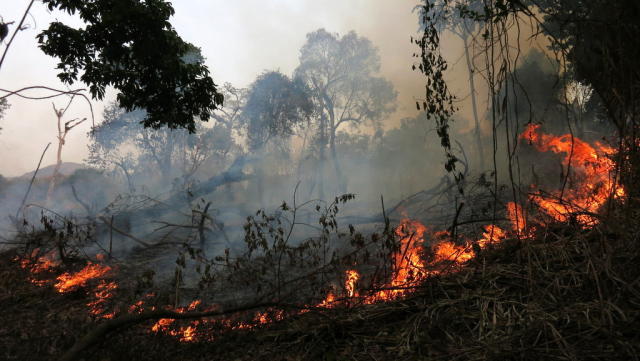
Often referred to as the Tubah Upland forest, the hitherto circa 4000 acre forest hosting some of the last remnants of the most endangered chimpanzee subspecies, the Nigeria Cameroon Chimpanzee, and serving as the only source of drinking water to over 100,000 Cameroonians, has been reduced to circa 200 acre and may disappear within the next five years if desperate and urgent actions are not taking now!
In an interview granted this reporter, June 27, 2017, the Executive Director of the Kedjom-Keku Conservation Association for Sustainable Development, Martins Mikes, gave a panoramic view of the plight of this biodiversity hot spot.
“one of the biggest threats to the forest is the totally wrong approach by the Ministry of Agriculture and Rural Development, who opened up road to this forest; for instance, the population has increased like ten times in the last six months just because of the road. Ndawara is also another threat. He rented some 2000 hectares from the former fon of Big Babanki (who was even burnt by the villagers because of this) but never gave back despite losing the case in 2012; he is instead increasing his plantation and extending to the Abongphen Highland Forest and the forest towards this area is gone because he’s got thousand of cows there and a big plantation, and to remove him is very difficult,” he quipped
The Kedjom-Keku Executive Director also painted vivid picture of how poaching and farming is gradually taking this key watershed shed to its early grave
“Poaching is going on there but there are not so many poachers because most of the animals have already been hunted. The biggest challenge is actually the turning of forest in to farmlands and residents. The villagers are selling the land to local cooperatives, lawyers, rich people etc. With all these, the forest is going to disappear latest in five years,” Mr. Mikes expounded
Besides hosting the Nigerian Cameroon Chimpanzees, the area is also quite important for bird diversity. There are over 100 species of birds of which a high percentage are endemic. They are also a good number of endemic reptile, amphibian, insect and plant species.
The Kedjom-Keku boss stated that the pressure exerted on the Abongphen Forest and its biodiversity, has short and long term effects on the neighbouring communities.
“The area is the only watershed area in Tubah Subdivision supplying water directly to about 100,000 people and indirectly to millions of people. It has over 100 springs and they are already getting dried. This is the first year the majority of the streams got dried; this has not happened before. I think it needs really serious and fast action to stop the deforestation otherwise in the next five years, thousands of people will suffer” he stated
Intervention of Kedjom-Keku Conservation Association for Sustainable Development
The Kedjom-keku Conservation Association for Sustainable Development, is a Cheq Republic based NGO working in Tubah Upland Forest with main focus to safe and restore this forests through tree planting, sensitization, and alternative livelihood provision.
This association have constructed a conservation centre in the forest area with a primary school, trained local bee farmers on bee keeping for a pilot project, established demonstration farms and forest plot and Planted thousands of trees around the already drying streams. The Chief Executive Officer, Martins Mikes, says the greatest set back to the realization of the Organisation’s goal is little or no law enforcement.
“We are trying to work in collaboration with MINFOF and to inform them of what’s happening on the ground daily but corruption is a whole issue. For example we saw a truck with planks, inform the Chief of Post about what is happening but he let the people pass. All the farmers break the law!” he lamented
The Abongphen (Tubah Uplnad) Forest is located a few kilometers away from the Bamenda with an altitude between 1500-2300m, surrounded by villages like Bambui, Small Babanki (Kedjom-Ketinguh), Big Babanki (Kedjom Keku) and Filge .
By B. Shancho Ndimuh







